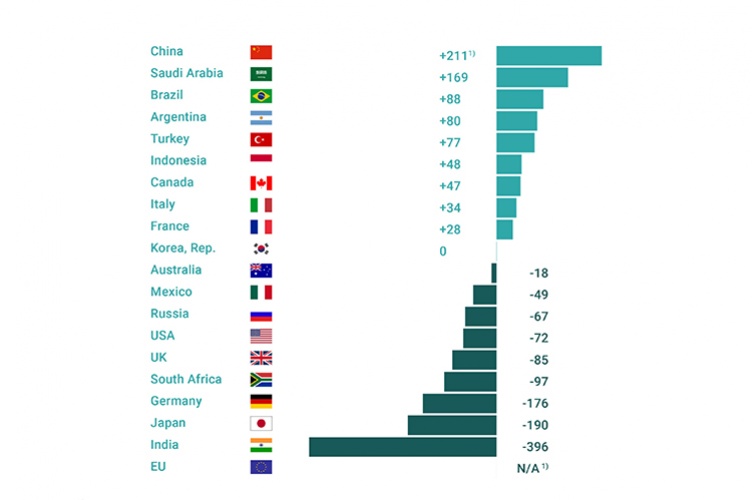Published by ESCP’s European Center for Digital Competitiveness, the Digital Riser Report 2021 reveals a growing divide in the speed of digital transformation, especially in Europe.
The Digital Riser Report 2021, which ranks and analyses the changes that countries around the globe have seen in their digital competitiveness over the past three years, reveals that leading industrial countries in the G20 have lost out in terms of their digital competitiveness and face new and dynamic competitors, most notably China: The Middle Kingdom was the top digital riser within the G20 (+211 ranks) followed by Saudi Arabia (+169 ranks), while the USA (-72 ranks), Germany (-176 ranks) and Japan (-190 ranks) lost ground significantly between 2018 and 2020. “Despite the wakeup call of the pandemic, our report highlights that digital technologies are still not a priority for many governments,” comments European Center for Digital Competitiveness Founder & Director, professor Philip Meissner. “This is surprising, as the way that governments manage and navigate the digital transition of their economies will determine significantly how competitive and prosperous their countries will be in the decades ahead.”
The top Digital Risers have followed comprehensive plans with ambitious goals and a focus on entrepreneurship
The report also highlights the best practices that top digital risers around the world implement, including ambitious goals for their digital transformation as well as a focus on entrepreneurship. “The top Digital Risers in our study share ambitious goals for their transformation efforts as well as a strong focus on entrepreneurship,” adds Professor Meissner. For instance, Vietnam was the top digital riser in East Asia and the Pacific in 2021, and its goal is to have the country’s digital economy account for 30 per cent of GDP by 2030.
In Europe, the two-speed transformation witnessed in the previous Digital Riser Report is continuing. While France made significant advances in terms of its digital competitiveness again (+28 ranks), Germany fell quite substantially during the same time period (-176 ranks). “Yet, our results also reveal that change can happen quickly with the right measures,” says European Center for Digital Competitiveness Founding Supporter Christian Poensgen. Italy, for instance, was able to improve its position in the Group of Seven from last place in the previous year to second place in 2021 by taking bold measures such as its “Repubblica Digitale” lighthouse initiative or the “Italian Startup Act”.
Campuses
